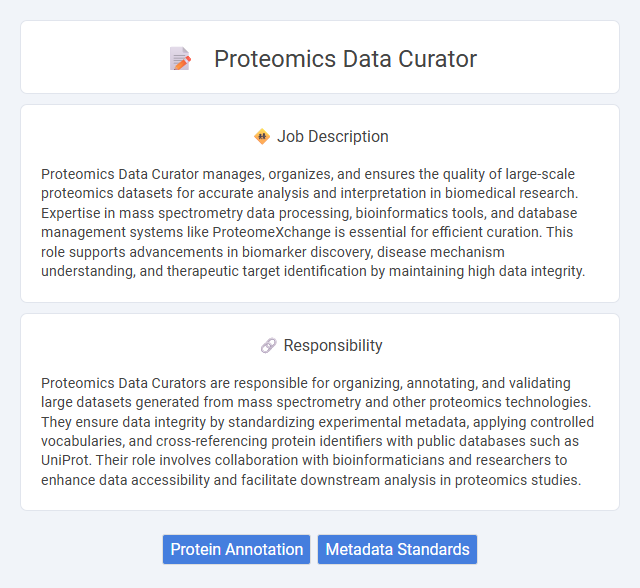
Proteomics Data Curator manages, organizes, and ensures the quality of large-scale proteomics datasets for accurate analysis and interpretation in biomedical research. Expertise in mass spectrometry data processing, bioinformatics tools, and database management systems like ProteomeXchange is essential for efficient curation. This role supports advancements in biomarker discovery, disease mechanism understanding, and therapeutic target identification by maintaining high data integrity.
Individuals with strong attention to detail and a background in bioinformatics or molecular biology are likely suitable for a Proteomics Data Curator role, as the job requires careful data analysis and organization. Those who thrive in structured environments and possess skills in data management and interpretation might find the position fitting for their expertise. Candidates lacking familiarity with proteomics technologies or data processing may face challenges in meeting the role's demands effectively.
Qualification
A Proteomics Data Curator must have a strong background in bioinformatics and molecular biology, with expertise in mass spectrometry data analysis and protein identification techniques. Proficiency in database management systems, data annotation standards, and knowledge of proteomic software tools such as MaxQuant or Proteome Discoverer is essential. Advanced degrees in life sciences, combined with experience in data quality control and metadata curation, enhance the ability to manage and interpret complex proteomics datasets effectively.
Responsibility
Proteomics Data Curators are responsible for organizing, annotating, and validating large datasets generated from mass spectrometry and other proteomics technologies. They ensure data integrity by standardizing experimental metadata, applying controlled vocabularies, and cross-referencing protein identifiers with public databases such as UniProt. Their role involves collaboration with bioinformaticians and researchers to enhance data accessibility and facilitate downstream analysis in proteomics studies.
Benefit
A Proteomics Data Curator role likely offers significant benefits such as gaining expertise in managing and interpreting complex biological datasets. This position may provide opportunities to work with advanced mass spectrometry technologies and bioinformatics tools, enhancing technical skills. It is probable that professionals in this job experience collaborative environments that foster interdisciplinary learning and career growth.
Challenge
Proteomics Data Curator roles likely present challenges related to managing vast, complex datasets requiring high precision in data annotation and integration. The probability of encountering issues with data consistency and standardization increases due to diverse experimental methods and formats. Efficiently curating such data may demand strong problem-solving skills and familiarity with bioinformatics tools to ensure reliable downstream analysis.
Career Advancement
A Proteomics Data Curator plays a critical role in organizing and validating complex protein data sets to enhance research accuracy and accessibility. Expertise in bioinformatics tools and data management software opens pathways to senior roles such as Data Scientist or Bioinformatics Specialist. Continuous skill development and collaboration with interdisciplinary teams accelerate career progression in the rapidly evolving field of proteomics.
Key Terms
Protein Annotation
Proteomics Data Curator specializing in protein annotation is responsible for accurately identifying and cataloging protein features such as domains, post-translational modifications, and functional sites using advanced bioinformatics tools and databases like UniProt and Pfam. Expertise in interpreting mass spectrometry data and integrating experimental results enhances annotation quality and supports downstream biological research. A strong foundation in molecular biology and computational analysis ensures the precise mapping of protein sequences to biological functions and pathways.
Metadata Standards
Proteomics Data Curators ensure the accurate organization and annotation of proteomics datasets by applying established metadata standards such as MIAPE (Minimum Information About a Proteomics Experiment) and PSI (Proteomics Standards Initiative) guidelines. They facilitate data interoperability and reproducibility by meticulously validating metadata completeness and consistency in public repositories like PRIDE and PeptideAtlas. Mastery of controlled vocabularies and ontologies is essential to enhance data discoverability and seamless integration within bioinformatics platforms.
 kuljobs.com
kuljobs.com